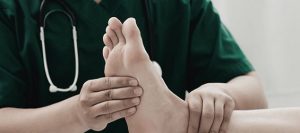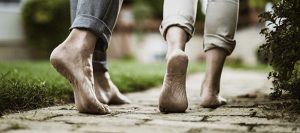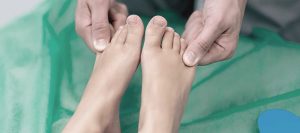
What does it really mean to have healthy feet?
Apart from being the opposite of unhealthy, this condition refers to living free from discomfort and pain that lives, walks and interferes with the quality of human life every single day.
This translates further into signifying good blood circulation, properly aligned bones and joints, strong muscles and ligaments and skin that is smooth and unbroken.
Our feet are the foundation of all mobility and physical activity.

When they are crying out for help, they usually bear the presence of corns, bunions, calluses or fungal infections.
It is said that the average person will walk the equivalent of twice around the world in a lifetime, which is a long time on your feet, especially if they hurt.
Help is on the way, however as there are many foot problems and diseases that can be prevented by practicing safe personal hygiene and adopting a regimen for heathy feet.
Take care of your feet and they will take care of you.
12 Helpful Tips For Personal Foot Care
1. Inspect Your Feet Regularly
Get to know your feet and check them regularly to ensure there are no changes in color, appearance or texture.
Look for cuts, sores, thickening or yellowing nails, new bumps or broken skin, which can be particularly dangerous to diabetics.
This is vital to catching any potential issues before they worsen and require attention from a licensed podiatrist.
2. Practice Good Hygiene
Wash your feet every day in mild, soapy water and dry them completely. Gentle scrubbing motions easily remove dirt and germs.
Clip toenails short with a safe clipper and always wear socks that are clean. Keep callus buildup down with a pumice stone.

3. Select Only Salons That Are Clean and Licensed
If you like to pamper your feet at a salon just make sure the place is licensed by the state board of cosmetology and that standard practices includes sterilizing all tools and instruments after each and every use without exception.
4. Keep Feet Moisturized
To prevent dryness and cracked skin and keep skin soft, a moisturizer is very helpful. and is best done after washing feet.
Lotions, such as shea butter or cocoa butter are good choices. Healing ointment is good for cracked skin.
5. Buy New Shoes Carefully
It is important to note that proper shoe size can vary depending on the manufacturer.
Avoid buying shoes in the morning and opt instead for later in the day because that’s when feet tend to be at their largest width. Always select the pair that feels best on your feet.
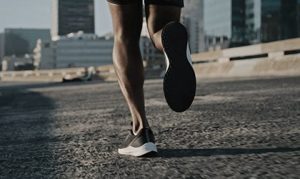
6. Never, Ever Ignore Foot Pain
Hopes of pain one day suddenly evaporating into the air high above your feet after a certain time will never happen.
Symptoms are more likely to increase if unattended, and this is the time for all good men and women to seek out the aid of a podiatrist to find both relief and solutions.
7. Always Cut Toenails Straight Across
Long toenails can make footwear uncomfortable. Cut toenails straight across and never cut into the corners of the nail. This can result in a painful, ingrown toenail.
The safest way to deal with this is to use a pair of podiatrist-approved nippers and an emery board to file down sharp edges.

8. The Importance Of Exercise
One of the best exercises for your feet is absolutely free.
Walking can help keep weight under control and naturally condition feet which are meant for little else. It is equally important to wear appropriate athletic shoes when exercising.
9. Never Go Barefoot
While it may seem whimsical and carefree, going barefoot can hurt your feet in many ways.
There’s no end to the troublesome things you can step on inadvertently around your home or garden including; angry bees; wood chips; broken glass; thumbtacks and intimidated, strange, wiggly things.
There are even more objects to worry about in public beach areas where hot cigarette butts, and torn aluminum cans are buried, but not like treasure, under the sand.
10. Alternate the Shoes You Wear Each Day
Your feet have sweat glands which absorb moisture. To avoid problems, allow shoes to dry out completely after each use.
11. Always Wear Comfortable Footwear
You must always wear shoes that fit properly and offer adequate support. This means no high heels, flip-flops, flats or any other type of shoes that do not provide any foot support.
There is no way to over emphasize the importance of this especially if you are on your feet most of the day or if you are headed outside for long walk.

12. Always Use Sun Block When Wearing Sandals
Most people probably wouldn’t even think about this, much less do it. It is very important though because your feet can get badly burned by too much sun.
13. Seek Help With A Podiatrist
Ultimately, never ignore heel pain, itching skin or a doctor’s suggestion or replace it with an at home treatment.
A knowledgeable podiatrist can quickly assess and create a treatment agenda that will help to restore your feet so that you may even want to dance again (or at least walk without limping).
If you are really wondering why the above tips are meaningful, consider the following foot conditions that are directly related to poor hygiene and can easily occur when you don’t take care of your feet.
Athlete’s Foot
Also known as tinea pedis, this infection of the skin and feet is caused by virulent fungi that thrive in moist, warm settings like locker rooms and pool areas.
It can attack any part of the foot, but is most often found in the space between the toes.
Prevention includes: keeping feet and toes clean and dry, and changing socks regularly.
Diabetes
If you are a diabetic, your nerves can be damaged and that can affect the blood flow to your legs and feet and increase the risk for infection.
Bacteria cause toenails to become friable, discolored and thick.
They enter the nail via tiny breaks in the surrounding skin and can cause a number of nasty things to happen that will require medical attention.
Hookworm
This parasitic round worm is the most commonly found in humans all across the world.
The infection it causes stems from geographic regions where there is very limited access to water and proper sanitation.
Never walk barefoot in these areas because the soil may be contaminated by human excrement.
Ingrown Toenails
Nasty and painful, untrimmed toenails can grow into the nail groove causing ingrown toenails, which can cause great discomfort.
Corns and Callouses
Both corns and callouses are caused by a buildup of dead skin, which occurs as a protective response to constant friction or pressure, and while they are not harmful, for those who suffer from poor blood circulation, they can easily become infected and cause much ado about something.
Make sure to include a surgical grade callus file and callus shaver in your collection of safe instruments and tools.

Bunions
These bony lumps can develop on the inside of the foot beside the big toe.
They can be treated with pads and such but if they became painful, w align can become very painful. You can protect yourself with a compression bunion preventer.
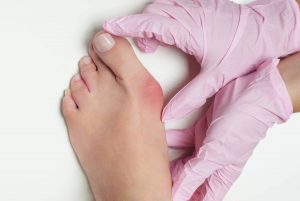
Watch Out For Pedicures
There should be, but of course there isn’t, a “proceed at your own risk” sign in front of every place that offers a pedicure.
While it is a wonderful way to pamper yourself, it can be a pandora’s box for contracting hepatitis B, MRSA, hepatitis C and athlete’s foot.
This is because foot baths are known to breed a rare, harmful bacteria known as M. fortuitum.
Do not have your cuticles cut, bring your own polish, request a square cut for nails and never let the beautician shave off dead skin with a razor.
Enjoy the experience but bring your own manicure kit just to be on the safe side.
Flip-Flops
The experts at Jaws Podiatry warn that while flip flops can be fun, they are not suitable for extended walking periods.
They increase the risk of metatarsalgia (pain in the ball of the foot) and bursitis ( affects the small, fluid-filled sacs that cushion the bones, tendons and muscles near your joints). and they can cause blisters to develop between the toes.
In Conclusion
Healthy feet are essential for a pain-free, active life, going beyond merely avoiding disease.
By following these 12 foot care tips, you can prevent common issues like athlete’s foot, corns, and bunions, while also protecting against more serious conditions.
Your feet support you throughout life’s journey, so they deserve attentive care to keep them strong and comfortable.
Remember, good foot health is foundational to your overall well-being.
- Foot Care Tips – The Ultimate Guide To Healthy Feet - February 11, 2025
- How To Use A Pumice Stone To Remove Tough Skin - December 15, 2024
- How To Choose The Best Toenail Clippers For Seniors - August 8, 2024

